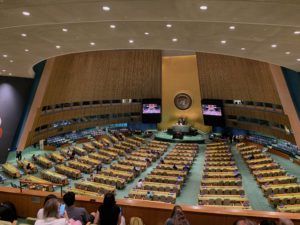August 2022 has graced us with the long-awaited Tenth Nonproliferation Treaty (NPT) Review Conference. Originally slated for 2020 but delayed multiple times due to the COVID-19 pandemic, this conference allows for governments, civil society, and others to gather and assess the effectiveness of the treaty so far, and establish next steps via an outcome document. Given the astounding inaction by nuclear weapon states recognized by the UN — China, France, Russia, the United Kingdom, and United States — on their Article 6 commitments to get rid of their nuclear arsenals, I didn’t have the highest hopes going into that first week of general debate.
By the time I left — after just six days of the month-long conference — I never wanted to return.
MY WEEK OF ANGER AND FRUSTRATION
In the first week of the conference, states were allotted five minutes to provide a general statement, allowing them to express their sentiments on the nuclear state of play. I was overcome with sadness and passion listening to the moving statement given by the Prime Minister of Fiji, discussing how Pacific Islanders have been waiting far too long for even just an apology let alone concrete action on disarmament. This passion was soon deflated by the United States’ failing to take a single shred of accountability for their role in dropping the only war-time atomic bombs over Japanese cities while continually pointing fingers at other states’ wrongdoings.
NATO was given the red carpet treatment. They were suspiciously allowed to speak during general debate despite not being a state. Furthermore, NATO propaganda from Western delegates also persisted throughout the week. We were never allowed to forget that NATO preceded the NPT and therefore must be legitimate, despite the fact that maintaining the nuclear umbrella only serves to uphold the nuclear status quo and provide the United States, United Kingdom, and France cover to lapse on their disarmament commitments.
What disarmament progress do we expect when the UN Security Council is dominated by nuclear weapon states who have shown us they are not serious about their commitments to disarm?
Meanwhile, civil society members like myself were downgraded to a peanut gallery, sequestered to the fourth-floor balcony, and denied access to the third floor where we would have been able to interact with delegates — something that is commonplace at the UN. I heard accounts of civil society folks being harassed by security, including from a delegate I met on the late Friday afternoon that NGOs were allowed to give their statements. Organizations like Mayors For Peace (with the Mayor of Nagasaki reading the statement), Nuclear Age Peace Foundation, Middle East Treaty Organization, and Abolition 2000 were among several groups that gave some of the most impassioned and hard-hitting statements from the entire week. In particular, PEAC Institute’s statement on the inherently racist, colonialist history of these weapons, and the joint youth statement read by Japanese youth activist Yuta Takahashi and Benetick Kabua Maddison, executive director of the Marshallese Educational Initiative, were the most astounding in highlighting the injustice these weapons have caused since their inception.
However impressive the NGO statements were, their sentiments were heard by only a handful of state delegations. Oh yeah — they allowed NATO a primetime slot and tossed NGOs at the end of the week when most delegates were already gone. This was after having to fight tooth and nail to even be allowed to attend the conference. For many people trying to come from non-Western countries, the hurdles they had to surpass and hoops they had to jump through ultimately prevented their participation at all. With the excessively stringent and tedious structure of several Western states’ visa processes that are almost impossible to navigate — especially if you come from a non-Western country — I am no longer surprised at the sea of mostly-white faces I saw around me among civil society participants. Others observed the noticeable lack of diversity at the conference as well.

A photo taken by Jasmine Owens, capturing the astounding lack of state attendance at NGO statements.
How does this illustrate an equitable and fair institution? How effective is this institution in its current form if the voices of a few hold more weight than others? Why have we not been able to make significant progress on disarmament in recent decades? What disarmament progress do we expect when the UN Security Council is dominated by nuclear weapon states who have shown us they are not serious about their commitments to disarm?
That Friday afternoon, the room was lacking in meaningful participation, leaving plenty of room for my anger and frustration to take up space.
Later that night, recounting the week’s events to a friend via voice message, I unexpectedly broke down in tears. To know on an intellectual level that nuclear-armed countries and their allies would do everything in their power to evade responsibility or accountability was one thing, but to experience it day in and day out for a week straight took more of a toll on me than I realized. And I wasn’t the only one. Many of the civil society participants that I spoke with were equally fed up with the mistreatment of civil society and the empty statements of several states, like the United Kingdom who touted their commitment to disarmament while conveniently not mentioning their decision from last year to increase their arsenal by 40% and cease making data public.
For all the talk from nuclear weapon states about how the Treaty on the Prohibition of Nuclear Weapons (TPNW) — the first treaty to outlaw nuclear weapons — undermines the NPT (it doesn’t), their actions are doing more damage to the efficacy of the regime than the TPNW ever could. Combine that with the mistreatment of civil society, and it’s no wonder that more and more countries are turning to the TPNW as a mechanism of applying pressure to nuclear weapon states to act on their disarmament commitments. Make no mistake, if the NPT regime were to ever fail, the blame lies not with the non-nuclear weapon states supporting the TPNW, but with the United States, United Kingdom, France, Russia, and China.
“DON’T MOURN, ORGANIZE!”
Despite my deep well of disappointment and disillusionment during the NPT Review Conference, it reassured me more than anything that working to build a broader nuclear abolition movement capable of pressuring nuclear weapon states to stop pointing fingers and do something about disarmament is vital if we are to ever live in a world without nuclear weapons. After all, hope lives in the power of the people to demand their inalienable right to not just survive, but thrive.
I don’t know how this latest NPT review conference will turn out, but to evoke the words of late labor activist and songwriter Joe Hill: “Don’t mourn, organize!”
There are several organizations working tirelessly to reverse the dangerous trend we’re on of maintaining a nuclear status quo. The International Campaign to Abolish Nuclear Weapons (ICAN) not only helped tremendously to get the TPNW entered into force, but they also have a great ICAN Cities Appeal program to get your city to take the pledge to urge your national government to sign on. Youth For TPNW provides an opportunity for individuals under 30 to join the movement to get full implementation of the TPNW.
International Physicians for the Prevention of Nuclear War and its global affiliates are mobilizing health professionals to join the nuclear abolition movement and use their health voices to make change. US affiliate Physicians for Social Responsibility (PSR) has chapters around the country that you can get involved with — or start one yourself. PSR also recently launched its #DemandAccess Campaign that seeks to amplify the voices of diverse young health professionals within the nuclear abolition movement and diversify the movement overall. These are just a few of the organizations doing on-the-ground work to make the world a safer, more equitable place, starting with the abolition of nuclear weapons.
To abolish nuclear weapons and rid ourselves of the constant existential threat that they impose on our daily lives — whether we realize it or not — will take all of us. Upending a 77-year nuclear status quo is no small feat, but it can and will be done by the people, for the people. There’s no time to wait for institutions such as the NPT to catch up with our rapidly-deteriorating reality.
We must fight for this future, or risk having no future at all. I don’t know about you, but I know which option I choose. Will you join me?
Jasmine Owens (she/her) is the Associate Director for the Nuclear Weapons Abolition Program at Physicians for Social Responsibility. Her work and her passions focus on centering our collective humanity in the fight for a more just and equitable world, starting with the abolition of nuclear weapons.





















